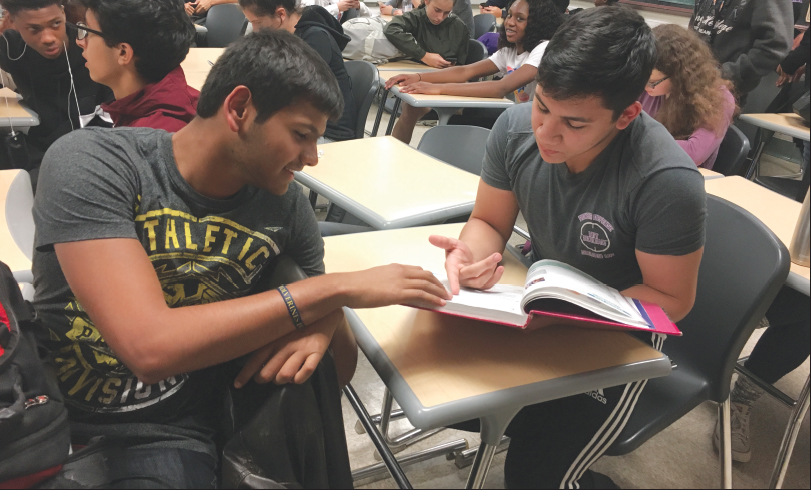Iraqi refugee Ghalib says gratitude fills his family
“I would fall asleep to gunfire and wake up to gunfire,” recalls Hasan Ghalib, a tenth grader at Pioneer. Ghalib was born in the heart of Baghdad, Iraq, under the bloody and brutal dictatorship of Saddam Hussein.
“ F r o m 2003 till 2006 I was pretty much locked inside my house,” he said. “I couldn’t go out onto the streets.”
Unlike the majority of Pioneer’s students, Ghalib spent his childhood inside his house in Baghdad surrounded by the constant noise of battle and destruction. Ghalib has many distinctive childhood memories that greatly differ from his American peers. “My mom used to hang our clothes outside to dry; when she would go to retrieve them they often had holes in them from shrapnel,” he said. Ghalib also described searching for an uncle’s body in one of Saddam Hussein’s notorious mass burial sites, in order to properly bury him. He had another uncle who was hung by Hussein.
Ghalib not only grew up in a war torn Baghdad, but also grew up without his father. “In 2004, we thought things had quieted down, and so my father went out to help clean up the city,” Ghalib said. “He never came back. I could just feel that he was gone. He was officially filed as deceased in 2006.”
Ghalib said he had lived through three years of terror and at times life for his family felt hopeless and even pointless, and yet everyday, his Mom worked tirelessly for his family.
In 2006, Ghalib and his family were forced to leave their family home by the American military because they needed it as a military base. “We didn’t want to leave the house, our family had built it and it was important to us,” he said.
Even when forced to leave his family home, Ghalib said his family felt only gratitude.
“We were fortunate enough to be taken in by our uncle; other families were left on the street with nowhere to go,” he said. The Ghalib family was forced out of their home and yet they looked upon the situation with only gratitude for the opportunity they had.
After staying at his uncle’s home for awhile, Ghalib and his family fled to Syria as refugees. “Syria was beautiful. You could walk around, it was almost surreal to us,” Ghalib recalled. He recalls being shocked that there was always electrical power in Syria. “The Iraqi government controlled our electric grid so power had a curfew – in Syria the power was constant,” he said.
Ghalib’s mom had to work extremely hard for his family. “She never wanted to say no if we wanted something; she’d work until we had it,” he said. No matter how back-breaking Ghalib’s mom’s work was, she came home to three kids who loved her greatly. Ghalib recalls giving her back rubs after work and overwhelming her with love.
“Back in Syria we were never really sad, that’s the thing, we always had love and support,” he said. Ghalib remembers when his Mom learned they were coming to the United States. “My mom suddenly began giving homeless people and people on the streets food because she said we had made it,” he said.
When Ghalib’s family eventually made it to the United States, his Mom continued to come home from a hard day’s work to a loving family. His mom has worked her way up to being a college Arabic language professor. It also took Ghalib a while to become the outgoing tenth grader he is now. He recalls adjustments he had to make in the United States.
“In Iraq, you only really greeted people you knew well. I would find myself walking down a street in the U.S. and when I’d make eye contact with a stranger, he would smile at me out of nowhere,” he said. Ghalib and his family were shocked by how outgoing and kind the people of America were. “The U.S. and the opportunity it provides boil down to the general goodness of the people,” Ghalib said.
Even after being born into a war, under a dictator, losing his father, forced out of his home, and living in a foreign land with a foreign language, Ghalib says he and his family are only grateful. Their family unity and support prevented the hopelessness and demoralization most would have felt in his situation.
“I’m lucky to be here. I get to spread my wings and grow here on my own now. I wouldn’t change a thing,” he said.


